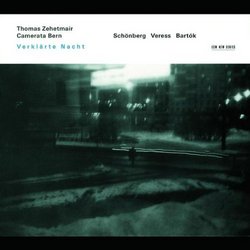Not everything is compelling, but the Bartok is a triumph
Santa Fe Listener | Santa Fe, NM USA | 05/09/2010
(5 out of 5 stars)
"In the years since its release in 2001, this critically acclaimed CD of modernist string music has gotten no nibbles at Amazon. the dreary cover and unfamiliar names may be the cause. I think the Amazon reviewer has gotten the general contours right. This Verklarte Nacht falls midway between the original sextet version and the one for full string body. Zehetmair wants to rub off the post-Romantic varnish, and yet I'm not sure what he's wound up with. We are meant to move from suffering to exaltation, or what's the point? Paring Schoenberg's idiom down to its emotional skeleton works in the short run -- you immediately notice that this isn't the usual style -- but Zehetmair cannot hold together the entire structure, an important aspect in a work this long (26 min.). Undeniably alert and inventive, his reading had zero emotional effect on me.
Sandor Veress, 1907-1992, was born in Hungary and took piano from Bartok, but from 1949 on he lived in Switzerland, teaching in Bern, hence his home town connection with the Camerata Bern. as the composition teacher of luminaries like Ligeti and Kurtag, Veress must have earned more than local prominence. His Four Transylvanian Dances sound like accomplished knockoffs of Kodaly and Bartok in their folkloric phase, with not-very-adventurous dashes of modernism. The Gramophone reviewer described the second dance as a kind of Magyar fugure, which gives you the combined flavor of rustic and academic.
The high point of the program is Zehetmair's alert, flexible, and varied reading of Bartok's chamber masterpiece, the Divertimento for String Orchestra from 1939. Over the years I've heard any number of good-enough readings, and most critics seem to gravitate toward Boulez's icy cold, rather rigid account on DG, made more forbidding by steely recorded sound. Zehetmair's approach is more human; he opens the windows and lets sunshine in. The contrast between the solo strings and the whole ensemble is well judged. What separates Bartok from a lesser composer like Veress, or even Kodaly, is his rigor in formal construction and the underlying emotional power he delivers, going far beyond Hungarian dance rhythms and folklore flavor. Zehetmair, more than anyone I know, captures the eerie, agonized sting of the Divertimento, making it sound for once as haunting as Bartok meant it to be."


 Track Listings (8) - Disc #1
Track Listings (8) - Disc #1